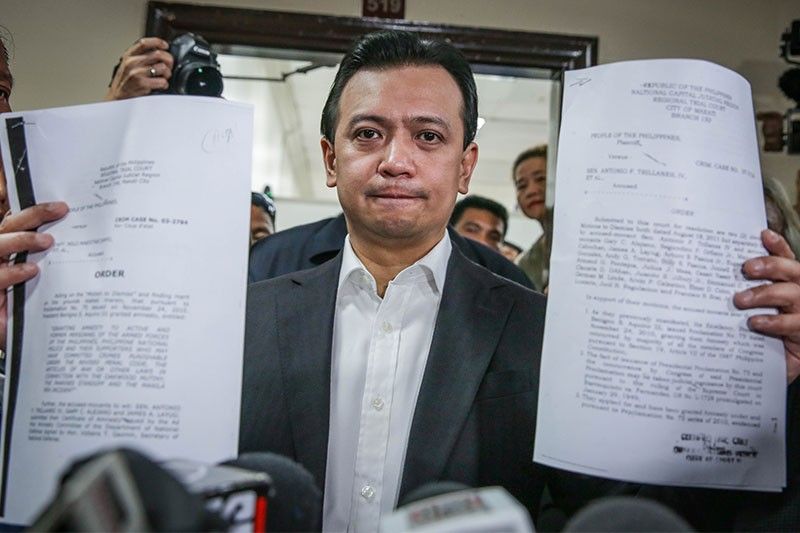Trillanes amnesty: Two courts and two rulings that may meet at SC

MANILA, Philippines — When President Rodrigo Duterte proclaimed that the amnesty granted to critic Sen. Antonio Trillanes IV is void, state prosecutors sought local courts to hold the senator accountable on charges that the courts had already dismissed in 2011.
They argued that while the courts did not err when they dismissed the case when former President Benigno Aquino III granted amnesty to Trillanes and other mutineers through Proclamation 75, the senator's cases should be revived since the amnesty was void from the very beginning.
Makati Regional Trial Court Branches 148 and 150 received the government’s pleadings the same week that Duterte's Proclamation 572 was published. The Supreme Court later directed the two courts to determine the factual issues on Proclamation 572.
Several pleadings and hearings later, the two Makati courts arrived at different rulings.
Makati RTC Branch 150 Presiding Judge Elmo Alameda granted the government’s motion for warrant—essentially reopening the rebellion case against Trillanes—and said on September 25 that the court found factual basis for Proclamation 572.
Almost a month later, Makati RTC Branch 148 Judge Andres Soriano rejected the motion. He said that while the court did not find Proclamation 572 unconstitutional, it lacked factual basis: Trillanes applied for amnesty and admitted guilt.
Best evidence
Makati RTC Branch 150: When Alameda conducted a motion hearing on September 14, he asked point blank for a copy of Trillanes’ filled out application form. This, he said, is the best evidence in the case.
Lawyer Reynaldo Robles, representing Trillanes, admitted in open court that they could not locate a copy of the form.
In their subsequent pleadings, Robles said that they found out that only one copy of the amnesty application form was given, and that copy was submitted to the Department of National Defense committee created to process the amnesty applications.
Alameda, in his ruling, stressed: “Evidently, he failed to present the original hard copy, a duplicate copy, or even a photocopy showing that he personally accomplished and filed with the DND Amnesty Committee his Official Amnesty Application Form duly acknowledged and stamp marked received by said office.”
Alameda again raised the matter of Trillanes’ application form when he held a hearing on October 11 on the senator’s plea for reconsideration. He said that had Trillanes presented the filled-out application form, “it would have ended the hearing.”
Makati RTC Branch 148: Judge Soriano in two hearings—on September 13 and October 5—did not ask for the application form.
Initially, Soriano allowed both camps to submit additional pleadings to expound on their arguments. Even after he received them, the judge opted to set another hearing to allow both camps to present their evidence.
In that hearing, both camps presented their witnesses: Officials from the Armed Forces of the Philippines and the DND, and a journalist.
More than two weeks later, Soriano handed out his ruling where he posed the question: “Are there evidence, other than the application form itself, to establish that Trillanes filed his application form amnesty?”
“Jurisprudence dictates that when the issue is the existence and due execution of a document and not its contents, the best evidence rule cannot be invoked and the Court need not address or consider the requisite for admissibility of secondary evidence,” Soriano said. This echoed a point argued by Robles.
“It is sufficient that the party offering secondary evidence establish the existence and due execution of the document by preponderance of evidence, and the Court, in such a case may admit secondary evidence without accounting for the original,” Soriano’s ruling read.
Factual bases of Proclamation 572
Makati RTC Branch 150: Unlike Soriano, Alameda ruled on—and granted—the government’s plea for warrant based on pleadings submitted by both camps. Affidavits, certifications and a news report were among the annexes to the pleadings submitted to the court.
Alameda held that Trillanes did not apply for amnesty under Proclamation 75, based on Lt. Col. Thea Joan Andrade’s certification that “there is no copy of his [Trillanes’] application for amnesty in records.”
On the matter of Trillanes admitting guilt, Alameda gave weight to a GMA News Online article where the senator was quoted as saying: “I would like to qualify that we did not admit to the charge of ‘coup d’etat’ or anything na finile sa amin because we believe hindi iyon ang nararapat na charge na ginawa sa amin (we believe that should not have been the charge against us).”
The court said that Trillanes made the statement, and he also failed to produce a copy of the application form where he would have signed an admission of guilt.
“Seemingly, the statements and declarations made by Sen. Trillanes when interviewed by GMA News and published with the heading ‘Trillanes avails of amnesty admits ‘breaking news’ are in conflict and irreconcilable with his adamant position that he applied for amnesty and admitted guilt,” Alameda held.
These, the judge said, proved that Proclamation 572 has factual basis.
Trillanes' camp is asking Alameda to reverse his ruling and conduct a testimonial hearing to "fully ventilate" the case. Alameda has yet to rule on their motion.
Makati RTC Branch 148: Soriano had a different appreciation of evidence presented to him.
Soriano held a separate hearing on October 5 as the Court “held it prudent and proper to set” the case for hearing on reception for evidence.
The hearing lasted six hours, with both camps given time to cross-examine a total of nine witnesses.
Soriano, in his ruling, gave weight to the testimonies during the last hearing.
He noted that Col. Josefa Berbigal—head of the DND Ad Hoc Committee Secretariat—and former Defense official Honorio Azcueta testified that they processed Trillanes’ amnesty application.
Soriano noted that, based on Berbigal and Azcueta’s respective statements, that there was no duplicate copy of the application form.
“The original form however can no longer be produced in Court, without bad faith on the part of Trillanes as it was apparently lost in the custody of public officers to whom it should be found,” the ruling read.
He added: “The non-submission herein does not indicate that he did not apply because it is the DND Ad Hoc Committee which was tasked to receive and process the applications and determine whether or not the applicants applied for amnesty.”
On the matter of whether Trilanes admitted guilt, prosecutors presented journalist Mark Merueñas, who attested that he had a recording of Trillanes’ quoted statement in his article.
But the Court said Trillanes’ statement “should have been the subject of consideration by the DND Ad Hoc Amnesty Committee when it processed and deliberated on the amnesty application of Trillanes.”
The Court noted that no opposition was raised from the DND Ad Hoc Amnesty Committee, the Secretary of National Defense and even the Office of the President.
“The matter cannot be resurrected herein,” the ruling read.
Soriano also noted that Merueñas also affirmed that he personally witnessed Trillanes filing his application.
Case reopened
Makati RTC Branch 150: Trillanes had been facing a charge of rebellion before Alameda’s sala, over his involvement in the 2007 Manila Peninsula siege.
Citing the amnesty granted by Aquino, Alameda dismissed the case on September 7, 2011.
When Alameda granted the government’s plea for warrant against Trillanes last September 25, he had effectively reopened the case.
He said that the 2011 ruling is void, as it accounted for “discovering of Sen. Trillanes non-filing of his application for amnesty containing admission of his guilt.”
He noted that the prosecution had yet to present its evidence on the rebellion case when it was dismissed in 2011.
Makati RTC Branch 148: Soriano, however, invoked the doctrine of immutability on the coup d’etat case against Trillanes.
He stressed that records showed that the case had long been dismissed by virtue of Proclamation 75—that he earlier noted was not, in fact, declared void by Proclamation 572. “The dismissal, it appears, has become final and executory,” the ruling read.
“Well established is the doctrine that a final and executory judgment shall be immutable,” he added.
Soriano stressed: “Given its findings, both on the legality of Proclamation 572, and its factual bases, the Court finds no reason to disturb the doctrine of immutability of a final and executory judgement.”
'Legal mischief': Battle to the highest court
With two courts handing down different rulings basing on essentially the same facts, the legal battle will ultimately lead to a higher court.
“This is the mischief that we had feared. Two co-equal courts coming up with different conclusions on essentially the same set of facts,” Integrated Bar of the Philippines head Abdiel Dan Fajardo said.
The IBP head said that both parties can still appeal Soriano’s ruling: Trillanes may appeal Makati RTC Branch 148’s finding that Proclamation 572 is constitutional, while the DOJ could seek to reverse the findings of fact by the court.
But with the two courts’ seemingly contradicting findings, the wisdom of a higher court may be required to shed light on the issue.
“These rulings will eventually have to be evaluated by the Supreme Court. The High Court will be the final arbiter once the conflicting findings become ripe for review,” Fajardo said.
Trillanes had earlier gone to the SC to challenge the constitutionality of Proclamation 572. While he failed to get the immediate relief of a temporary restraining order, his petition remains pending before the high court.
Former SC spokesman and law professor Theodore Te echoed Fajardo: “Ideally those two rulings are going to make their way up the judicial hierarchy: CA and then most likely SC.”
Te told ANC’s “Early Edition” that: “I would suppose as far as the SC petition is concerned, it’s a waiting game now...how the two branches would be able to not only work out differences—because they can, they are coordinate courts, one cannot overrule the other but how these two cases...make their way up the judicial chain.”
After all, Soriano himself said: “The law is vibrant. Jurisprudence is its lifeblood. Subsequent jurisprudence may forge new horizons in which exceptions to the immutability of a final and executory judgement may be born.”
- Latest
- Trending
































